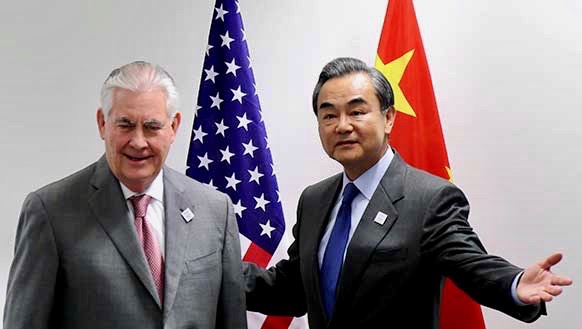TOM PLATE WRITES -If you’d like a snapshot of the current state of US diplomacy versus the state of PRC diplomacy, simply compare how the two top diplomats of each country are doing. Not so good for the American side: whereas the foreign minister of China looks well-suited, secure and competent, the American looks shaky, even over his head. Unfair? Superficial? Perhaps … maybe not.
Start with the American secretary of state, Mr Rex Wayne Tillerson: Unaccustomed as I am to defending former U.S. oil executives, still, in all decency, somebody might tender a nice word for the once CEO and chairman of ExxonMobil, 2006-2016. Though Secretary Tillerson is on the outs with his boss and may soon be flat out of office, he is not remotely the weakest appointment in the Donald J, Trump administration. Tillerson had been well touted by widely respected former Defense Secretary of Defense Robert Gates, as well as by former Secretary of State Condoleezza Rice. The appointment went down in February. It has been bumpy ever since.
Striking gold is never easy, whether in vital appointments or in the big-time oil business; but in the field of international diplomacy, itself a slippery, oily place, Tillerson found himself on extremely unfamiliar turf. Not to be crude about it, but reports out of Washington say his days are numbered, as in single or double digits. In all fairness, world politics is more complicated and inclusive than ever, so perhaps the job of chief U.S. diplomat is not suited for mere mortals anymore, no matter how germane the resume. The energy-industry careerist’s cosmopolitanism came from extensive foreign business travel, but international diplomacy is a more complex drill.
At the same time his podium persona lacks that off-putting slickness that makes one question the trustworthiness: Mr Tillerson – unlike, say, Dr Henry Kissinger- speaks in straight-forward English without giving you the feeling that maybe you are being lied to. He also comes across as an actual adult – a standout trait in the Trump administration. Tillerson, even if he had the academic credentials and background of a Kissinger, labors for a testy boss whose own weak grasp of international issues seems not to deter him from putting his hex on Rex. These mixed-message wobbles, especially on an issue as dicey as North Korea, are unnerving and can nudge the conduct of American foreign policy off-track, and possibly into an embarrassment of ditches.
On the Chinese side: Career diplomats in the Ministry of Foreign Affairs, in that gigantic headquarters building in Beijing’s Chaoyang District, must be on a high. By contrast with their global competitor, Chinese foreign policy, as currently enunciated, seems relatively forward-looking and coherent; and when they compare Tillerson to their boss, Wang Yi, the PRC foreign minister, their morale must soar higher still. Mr Wang is a career Chinese diplomat, trilingual in English and Japanese, who impresses his interlocutors for “always thinking strategically, never losing focus” (as one prominent former Asian prime minister tells us) and, per another source, gives off a confident air that his China “is on par, if not exceeding the U.S., in many ways.”
Foreign Minister Wang’s confidence was evident in a speech earlier this month in Beijing: “China has no intention to change or displace the United States [but] the … ever more extensive cooperation and close exchanges at different levels have tied the two countries’ interests closely together. There is far more that they share than they disagree. Cooperation leads to win-win outcomes while confrontation can only result in a lose-lose situation. This is a plain truth that anyone with a strategic vision and sober mind will recognize. It is a trend that will not bend to the will of any individuals. Recognizing this, China and the US need to find ways to better get along with each other.”
This was a well-crafted speech (the speechwriter who actually penned it deserves a medal): “Trying to reverse the trend of globalization will be futile, just as it is impossible to channel the water in the global economic ocean back into isolated lakes and creeks…. Those who pursue protectionism will lock themselves in a dark room deprived of light and air…. We will see light at the end of the tunnel as long as we keep moving forward.” FM Wang was diplomatically indirect about some hot issues, but his meaning was unmistakable. “Some countries outside this region seem to feel uncomfortable with the calm waters in the South China Sea and are still looking for opportunities to stir up trouble. However, just as the high mountains cannot stop the river from flowing to the ocean, the positive trend in the South China Sea cannot be reversed.” Not that further punctuation of China’s intent was necessary, but Wang chose to conclude this way: “Let me end by quoting from a poem, ‘With the rising tide and favorable wind, it is time to sail the ship and ride the waves’.”
The message to Washington, and the world, could not be plainer. Whether the U.S. response comes from Mr Tillerson or from a new secretary of state, a thoughtful and well-articulated locution of vision from the U.S. is needed before the world starts to wonder if we still have it in us to match up against the talent in the China’s Ministry of Foreign Affairs. And the Trump administration will certainly not achieve this by cutting the budget of the State Department, demeaning the great U.S. Foreign Service, and trivializing its secretary of state. Whatever its faults and mistakes, China doesn’t do that. The U.S. appears to be in the midst of an immense self-demotion in foreign-policy intensity and vision. Contrast this with Wang’s game.
Professor Tom Plate, author of the recent ‘Yo-Yo Diplomacy’ and the four-book ‘Giants of Asia’ series, is Loyola Marymount University’s Distinguished Scholar of Asian and Pacific Affairs, vice president of the Pacific Century Institute, and a columnist with the South China Morning Post, where this column first appeared.

